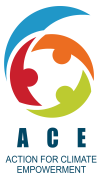Global Online Policy Forum: Actionable Climate Civics
Climate civics is any activity that empowers citizens, communities, and political decision-makers to work together to design and to live a smarter climate future. We will be focusing in this Global Online Policy Forum on ways of turning Action for Climate Empowerment into both an expansion of the global civic space and real and measurable action to reduce the threat of climate change and build value at the human scale.
- Learn more at https://engage4climate.org/ace
- Join the meeting up to 10 min prior to the start time, on Friday, May 27, at http://fuze.me/32853850
- RSVP at the event page on Facebook: https://www.facebook.com/events/1132936463418924/
ACE = Action for Climate Empowerment
 ACE is the interactive agenda for implementation of Article 6 of the UN Framework Convention on Climate Change. Article 6 requires all nations that are Parties to the Convention to provide resources for building awareness, local capability, information sharing and ongoing engagement.
ACE is the interactive agenda for implementation of Article 6 of the UN Framework Convention on Climate Change. Article 6 requires all nations that are Parties to the Convention to provide resources for building awareness, local capability, information sharing and ongoing engagement.
Find out more about our ACE engagement work…
Input to Consultations on Article 6 of the Convention
We see four key concepts and actionable priorities as central to success of UNFCCC Article 6, Paris Agreement Article 12, the universalizing of serious, ongoing engagement, and to the success of a timely global transition:
- Citizen participation in national, regional, and global processes
- ACE platform for active collaboration and mutual empowerment among non-party actors engaging citizens
- Universal stakeholder status, as under the Aarhus Convention
- Principle of mutual education (governments to citizens, and citizens to governments)
Click here for the full submission.
Civics to Accelerate Climate Action
By involving people and communities in the design of policy priorities and implementation strategies, we can achieve a more diverse and adaptive curation of best practices, so we have better information about local needs, capabilities and actions, and always-active opportunities for raising ambition. By opening the process of breakthrough innovation to more minds, and by connecting more people to the smartest proposals and processes, we can succeed faster together.
If the overall effort is ultimately what it should be, then Indonesian tribal villagers, university students in Jakarta, United States Senators, Inuit communities living above the Arctic Circle, and scientists running the global seed bank in Svalbard, along with everyday people from anywhere, can all act as peers in a web of insight that helps all of us to make our best practices better and to accelerate the pace at which we build a climate-smart future.
Click here to read the full article.
UPDATE: Feb. 20, 2016
Paragraph 20 of the Doha Work Programme on Article 6 of the Convention calls for
public participation in addressing climate change and its effects and in developing adequate responses, by facilitating feedback, debate and partnership in climate change activities and in governance, noting the important role that social media platforms and strategies can play in this context.
 The CCEN is an always-active, open and inclusive platform for direct citizen collaboration in this work.
The CCEN is an always-active, open and inclusive platform for direct citizen collaboration in this work.
On Friday, February 19, the CCEN was proposed as a mode of reform for the implementation of the Doha Work Programme. The submission was made by IAAI on behalf of the CCEN project and coalition partners.
Article 6 of the UN Framework Convention on Climate Change calls for facilitating participation by citizens, but does not lay out a specific process for that engagement. As a result, the governments who are Parties to the UNFCCC have left the focus of Article 6 more on education and information, sometimes making an effort to provide training and support to constituencies that can benefit from participating in climate solutions.
In June 2015, the Article 6 dialogues called for a significant intensification of:
- Climate education, at all levels, especially among youth
- Training and support for vulnerable communities
- Technical training for businesses and local officials
- Direct citizen participation in climate policy and in the global process
During the COP22 climate negotiations in Marrakech, the Participation Workstream will publish a daily, evolving “evergreen” report on the state of public access to participation, related news, and relevant developments in the implementation of the Paris Agreement.
To join, go to our Workstreams Portal, scroll down and sign up.
The question, for many, remains: what can citizens do, while stepping up their engagement, to help achieve the other goals of the Convention, such as especially: avoiding dangerous anthropogenic interference with the climate system?



You must be logged in to post a comment.